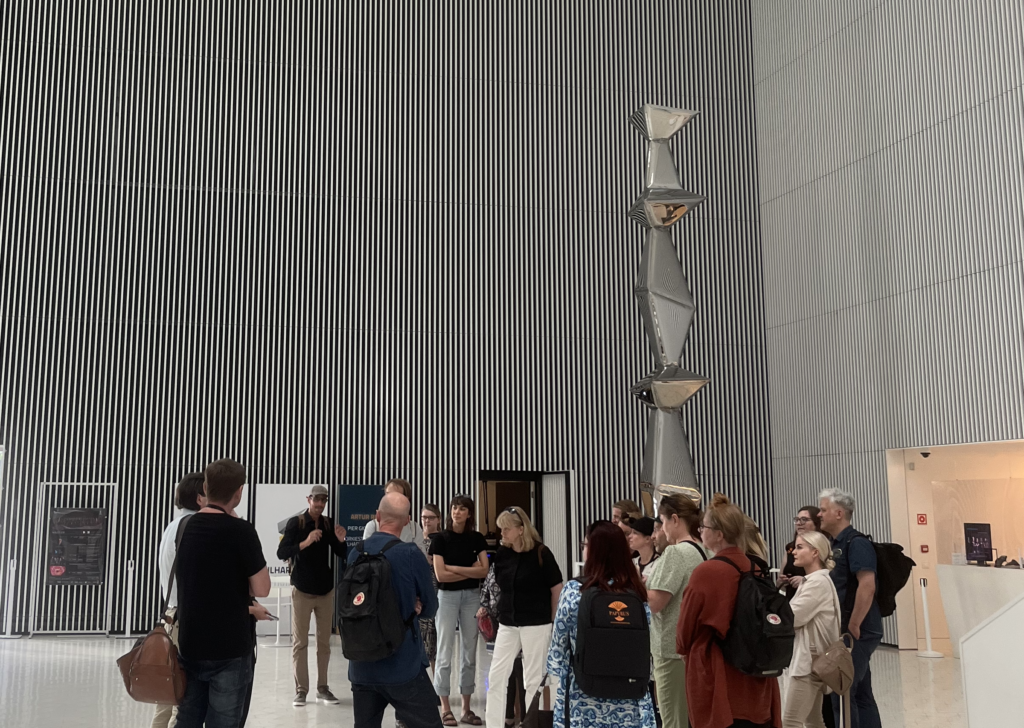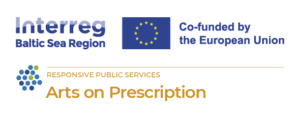Enhancing Mental Health: Fostering Well-Being in the Baltic Sea Region
The project Arts on Prescription in the Baltic Sea Region helps public authorities, cultural and health institutions engage people with mental health challenges in social and non-therapy art activities. By doing so the goal is to improve their mental well-being. The NDPHS Secretariat together with eleven project partners from the Baltic Sea Region and Odense Municipality as a lead partner, began the project in January 2023.
The Arts on Prescription in the Baltic Sea Region project partner Marta Ciesielska from Marshal’s Office of the Westpomeranian region shares what keeps her inspired to work on Interreg projects for 17 years and most importantly, what drives her to this project and what challenges she foresees as it evolves.
Interview by Anna Zaccaro
What inspired you to lead this project?
We were drawn to the project because it addresses critical mental health issues, which are particularly relevant due to ongoing regional and global challenges. We also found it innovative, bridging medicine and art, and the opportunity to cooperate with valuable partners.
What is the challenge you aim to tackle through this project?
We are faced with significant challenges, including ongoing conflicts, immigration issues, and a climate crisis. These circumstances have led to a widespread emotional impact on individuals, characterized not necessarily as negative but rather as intense. Thus, many are actively seeking solutions to cope with these challenges. Mental health should and is a priority for our citizens and region. Hosting an international conference will help disseminate knowledge. It will also empower citizens to implement ideas on a local scale, reaching beyond capital cities.
Why do you need a transnational project to address your challenge?
International collaboration was challenging during the pandemic, and now we aim to establish connections that will facilitate cooperation, not just within the project but also beyond its completion. This is of paramount importance to us. While transnational projects are inherently challenging, in the case of our current project, international cooperation is imperative. Poland lacks the necessary expertise to implement programs of this complexity. Therefore, we place great importance on engaging in international cooperation. Denmark, with its experience in this field, plays a pivotal role as a leader. However, we view them not only as leaders but also as valuable partners who can impart their knowledge and assist us in our endeavors.

AoP Workshop in Szczecin – Visit to the Philharmonic in Szczecin ©Media Dizajn Association/Artur Aramen
Who will benefit from your project most?
The project is dedicated to different age group, however mental health problems among young people have surged, and this project can provide them with tools to cope. Personally, I’ve witnessed how art can positively impact mental well-being, as my niece used it to overcome her teenage struggles. We hope to make a real difference, even if our project’s initial goal is modest. It’s an ambitious project with far-reaching potential.
As you envision the project, what do you anticipate as the most challenging aspect?
Well, we’ve been implementing the project for twelve months now, and I’m not too concerned about the program itself. We’ve learned a lot from experienced partners, and our partnership is strong. What does worry me are the communication activities aimed at stakeholders. These stakeholders come from three different areas: medicine, art, and administration, and sometimes they speak different languages. Our communication activities need to cater to their unique language, ambitions, and needs. We must demonstrate that these solutions are cost-effective, capable of solving local problems, and easy to implement. Convincing all stakeholders in the limited time frame may be a challenge, but it’s the crucial first step. With data from our pilots, we’ll have the material to make a real change.
On the other hand, what aspect excites you the most?
We’re quite excited about the pilot activities. While we have more work to do than others because we’re building something from the ground up, it’s also a thrilling opportunity. We’ve chosen three cities in our region to organize pilot activities, and we believe these cities will be eager to participate. The pilot phase has been something we’ve eagerly awaiting, and it requires significant effort, but it’s where we see the real impact of our future activities. We’ve just completed the first phase of the pilot and the results are very interesting, so I’m excited to see what the next two phases will bring. It’s like a small-scale trial, where we can learn and adapt.
Could you share some insights into your previous experience with Interreg projects? How have these experiences shaped your perspective, and what have you learned?
I have been involved in Interreg projects for 17 years, working across different programs like Central Europe, Baltics, and the European region. My first project, which focused on transport, was quite challenging as I didn’t know much about international projects. However, it taught me that when you’re part of a project, it’s like embarking on a challenging journey. You have a supportive network of leaders, partners, national contact points, and valuable resources. What’s fascinating is that Interreg offers various ways to acquire knowledge. You can read, watch presentations, or join online workshops. This flexibility allows individuals to learn in ways that suit them best.
Source: https://interreg-baltic.eu/

Arts on Prescription receives financial support from the Interreg Baltic Sea Region and is co-funded by the European Union.
